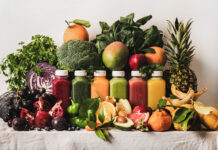
By Martin Stoll, Founder and CEO, Sparkloft Media
From social interactions to purchase habits, Americans are consciously and unconsciously shrinking their worlds, pursuing closer, more tight-knit connections with one another. How do food & bev marketers, in this entirely new way of living and selling to the consumer, manage their campaigns to keep companies successful and in-the-know, without seeming tone-deaf or out of the loop as we confront an impending global recession and possibly even a depression?
History is bound to repeat itself just as markets ebb and flow. While, yes, this is an unprecedented pandemic, we’ve made plenty of advancements, examining recessions of the past that can offer insights into what marketers should expect in these extraordinary circumstances.
Consumers are prioritizing the comforts of community, mutual support, and personal interaction in the physical spaces where they live and in the digital spaces where they spend time online. Overwhelmed with the scale of the pandemic, they direct their energy to their immediate communities and find solace in the nostalgic and familiar.
As burnout sets in, people will continue to retreat to what they know, whether it’s their hometown, or smaller cities that boast a more affordable cost of living, private online groups around a core subject, or even tight-knit political in-groups that unite around a common enemy.
There are key implementations marketers can learn from the past, when reconfiguring their sales tactics, for a more direct-to-consumer feel.
Then
Long before the phrase “conscious consumerism” was coined, Americans produced their own food and other goods as a patriotic act of unity through crises. During WWI and WWII, “Victory Gardens” reduced the strain on the food system as commercial farms diverted resources to the troops, with 40% of U.S. produce grown at home. The Victory Garden movement boosted civic morale by giving every American a concrete action they could take to support overseas war efforts, quite literally from their own backyard.
Now
Cooking, gardening, and homesteading are making a comeback as Americans deal with the restlessness of isolation and the threat of a crumbling food supply chain. As large-scale systems of production show signs of weakness, many Americans have shifted their purchase habits to community-driven alternatives closer to home: buying directly from farmers, supporting small local businesses and even returning to old-school systems of bartering and gifting. As in wartime efforts, this local, human-to-human focus indicates a desire to feel helpful and connected in a time of uncertainty, fear and loneliness.
Implications for marketers
Think local and tell stories that show the positive human impact of your brand on their immediate community. Consumers demand more transparency about the ethics of production, but they are also more willing to try unconventional purchase methods if they support these values. Now is the time to try creative, community-oriented solutions.
There’s no telling how the economy will adjust or if panic buying tendencies will continue to impact the F&B space. What is certain, though: if consumers cannot find a product in store — or don’t want to risk checking — they order online. Knowing the local economy is also suffering, some consumers are investing more in farmers markets, mom-and-pop shops and stores that make their communities special. Getting your message of availability to the proper audiences will be key to brand building and awareness.
 Martin Stoll is the founder and CEO of Sparkloft Media, a social-first creative agency. Sparkloft’s perspective is that in today’s world social media is fundamentally impacting most aspects of our lives and should therefore be used as part of marketing, recruiting, B2B sales, market research, product development or design initiatives.
Martin Stoll is the founder and CEO of Sparkloft Media, a social-first creative agency. Sparkloft’s perspective is that in today’s world social media is fundamentally impacting most aspects of our lives and should therefore be used as part of marketing, recruiting, B2B sales, market research, product development or design initiatives.
Sparkloft Media supports its clients with social media strategy, content marketing, community management, trend reporting, social media co-ops, training and education, social commerce, integrated campaigns and influencer programs. For more information, visit sparkloftmedia.com.







